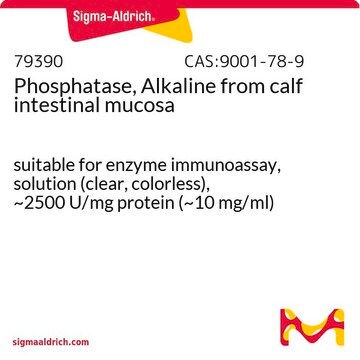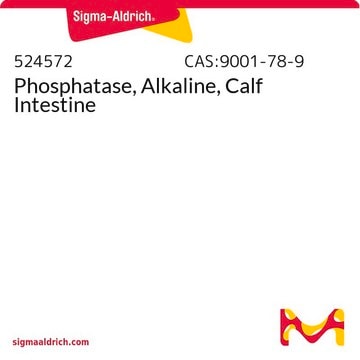RAP-RO
Roche
rAPid Alkaline Phosphatase
1 units/μg protein, optimum reaction temp. 37 °C
Sinonimo/i:
alkaline phosphatase, cloning of dna fragments
About This Item
Prodotti consigliati
Origine biologica
bovine intestine
Livello qualitativo
Ricombinante
expressed in Pichia pastoris
Forma fisica
liquid
Attività specifica
1 units/μg protein
PM
monomer 56 kDa by SDS-PAGE
Confezionamento
pkg of 1,000 U (04898133001 [1 U/μl])
pkg of 5,000 U (04898141001 [1 U/μl])
Produttore/marchio commerciale
Roche
Concentrazione
<0.1 % (w/w)
Parametri
37 °C optimum reaction temp.
tecniche
molecular cloning: suitable
Colore
colorless
pH
7.6-8.5 (68 °F)
Solubilità
water: miscible
Compatibilità
suitable for molecular biology
N° accesso NCBI
N° accesso UniProt
applicazioni
life science and biopharma
Attività estranea
Nicking activity, none detected (up to 20 µl enzyme using pBR322-DNA/ 16h / 37°C)
unspecific endonuclease, none detected (up to 20 µl enzyme using Lambda-DNA 16 h/37 °C)
Temperatura di conservazione
−20°C
Informazioni sul gene
bovine ... ALPI(280993)
Categorie correlate
Descrizione generale
Specificità
Heat inactivation: rAPid Alkaline Phosphatase is inactivated by incubation at 75 °C for two minutes.
Applicazioni
- Use rAPid Alkaline Phosphatase in numerous applications, including: Removal of 5′-phosphoryl groups from nucleic acids
- Preparation of templates for 5′-end labeling
- Clean-up of PCR products by removal of dNTPs
- Dephosphorylation of proteins
Note: rAPid Alkaline Phosphatase is also included in the Rapid DNA Dephos & Ligation Kit, which enables fast and efficient dephosphorylation and ligation of sticky- or blunt-end DNA fragments. With this convenient kit, dephosphorylation of blunt and sticky 5′-overhanging ends is performed in ten minutes at +37 °C and ligation is completed in just five minutes at +15–25 °C.
Caratteristiche e vantaggi
- Eliminate contamination risk: Recombinant expression, and reliable and sensitive quality control tests ensure high purity.
- Replace your current phosphatases with an economical solution: rAPid Alkaline Phosphatase performs equally as well as Shrimp Alkaline Phosphatase or Bovine Alkaline Phosphatase.
- Eliminate the risk of animal-derived diseases: Expression in Pichia pastoris ensures consistency and safety.
- Benefit from rapid heat inactivation: rAPid Alkaline Phosphatase is inactivated after only 2 minutes at +75°C.
- Obtain consistent performance: rAPid Alkaline Phosphatase has excellent stability during storage compared to other alkaline phosphatases.
Confezionamento
Qualità
Definizione di unità
Volume Activity: 1 U/μl
Altre note
Solo come componenti del kit
- rAPid Alkaline Phosphatase Buffer 10x concentrated
- rAPid Alkaline Phosphatase 1 U/μl
Codice della classe di stoccaggio
12 - Non Combustible Liquids
Classe di pericolosità dell'acqua (WGK)
WGK 1
Punto d’infiammabilità (°F)
does not flash
Punto d’infiammabilità (°C)
does not flash
Certificati d'analisi (COA)
Cerca il Certificati d'analisi (COA) digitando il numero di lotto/batch corrispondente. I numeri di lotto o di batch sono stampati sull'etichetta dei prodotti dopo la parola ‘Lotto’ o ‘Batch’.
Possiedi già questo prodotto?
I documenti relativi ai prodotti acquistati recentemente sono disponibili nell’Archivio dei documenti.
I clienti hanno visto anche
Il team dei nostri ricercatori vanta grande esperienza in tutte le aree della ricerca quali Life Science, scienza dei materiali, sintesi chimica, cromatografia, discipline analitiche, ecc..
Contatta l'Assistenza Tecnica.









